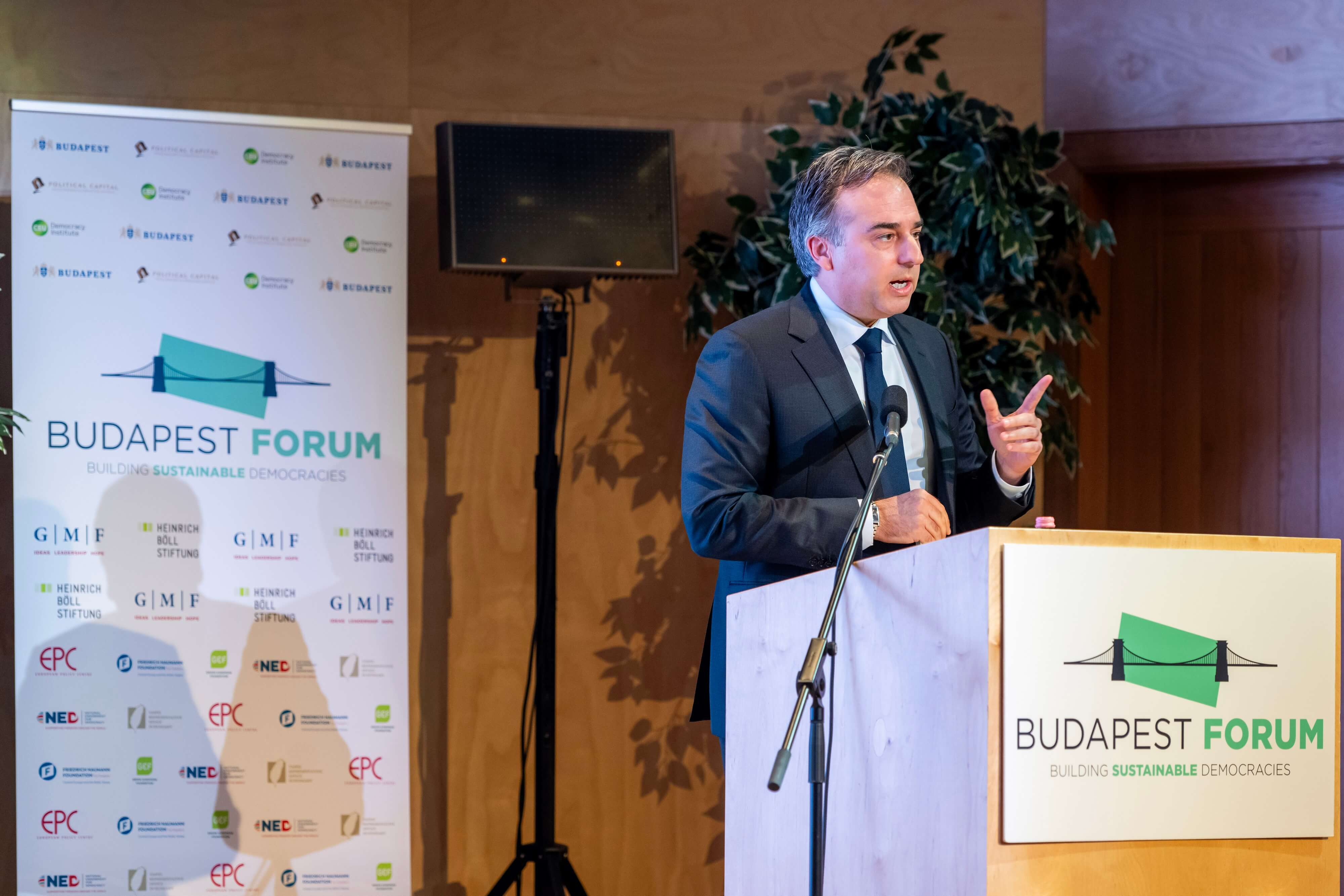Keynote Speech by Ambassador David Pressman
2024-09-26
Speaker
David Pressman, Ambassador of the United States of America to Hungary

Main takeaways:
- He emphasized the counsel he had been given in preparation for the assignment in Hungary, namely, to “watch what the government does, not what it says.” His speech centered predominantly on the government’s communication strategy and its implications.
- He underscored that Hungarians have a history of this kind of dualism, holding two contradictory views simultaneously. The legacy of double-speak left its mark where political claims do not match actions:
- „How can a country of ’56 also be so cozy with Putin’s Russia?”
- „How can a country be both a member of the European Union and also be at war with ’Brussels?’”
- „How can an ally of the United States also – in the prime minister’s words – be its ’adversary’?”
- The EU and the U.S. considered Hungary’s statements as “just words” and responded to this communication strategy with eyerolls as opposed to responses. This limited engagement has not led to a communication crisis in Hungary but a democratic one.
- The Hungarian government’s communication and actions are increasingly and concerningly merged where the billboards, headlines, and words are no longer mere words. They have an impact, a purpose, and a goal.
- Hungary has reached a point where many people ask whether Hungary is a democracy, which should be easy to answer for an EU member and a NATO Ally.
- In his view, the two pillars of democracy are freedom of media and a functioning civil society, and the Sovereignty Protection Office has been attacking these two pillars in recent months. The Office announced three investigations: one against Transparency International, which has ranked Hungary as the most corrupt country in Europe; the second against Átlátszó, an independent media outlet that investigates corruption, and the third against NGOs, that raised questions about the safety implications of a battery plan.
- He recalled the assertation of the leader of the Sovereignty Protection Office that NGOs cannot fight corruption, only government can do that. The Sovereignty Protection Office is trying to protect something, but it is not Hungary’s sovereignty.
- The government-controlled media and its attacks on civil society have created an atmosphere of fear where there are consequences for speaking up. “If you speak up, you will likely become a target and subjected to online smear campaigns by Megafon” – cited the case of Pastor Gábor Iványi as an example.
- He also recalled that shortly after arriving in Budapest, he had normal diplomatic meetings with the leaders of Hungary’s judicial institutions. After the meeting with the leadership of the National Judicial Council, the government launched a campaign against the two judges, labeling them as traitors. It warned all others that they could be next, and none would want to be next.
- The result is fear and silence, which is a hotbed for corruption.
- The Hungarian government criticizes NATO from within the comfort of the NATO security umbrella and the EU under subsidy of its economic umbrella, while China and Russia are exempt from this criticism in the name of connectivity.
- In his address at Tusványos, Prime Minister Viktor Orbán called Russia’s “hyper-rational leadership” as “understandable and predictable” despite launching the largest war in Europe since the Second World War while labeling the democratic West’s value-based partnerships as “irrational”.
- While Orbán was meeting with Putin on his so-called peace mission in July, the U.S. and its allies were working behind the scenes to free people unjustly imprisoned in Russia. The U.S. managed to free 16 people from captivity, while Russia launched missiles into Ukraine's largest children's hospital the day after the Hungarian prime minister's flight took off.
- Against the backdrop of an election in the United States, the Hungarian Prime Minister Orbán has made no secret of who he would like to win. However, it is erroneous to assume that actions that risk reducing a security alliance between two great nations into a political alliance between two big personalities serve any democratic, allied relationship anywhere. The U.S. has alliances with countries, not personalities within them.
- He recalled his address six months ago on the occasion of the 25th anniversary of Hungary's accession to NATO, in which he emphasized that the United States wants a close relationship with Hungary based on transparency, dialogue, nonpartisanship, and a commitment to democracy. In the past six months, the Hungarian government has expressed it does not share the same vision.
- While the U.S. would like to normalize its relationship with Hungary, the conventional wisdom that the Hungarian government’s communications were “just words” was wrong. Hungary’s allies and partners cannot dismiss the Hungarian government's communication with an eyeroll. Instead, they should treat the words as such and respond accordingly.
- In his closing remarks, he alluded that this new approach may mean a different kind of relationship, which could be closer, more honest, and more candid.
Copyright 2026. Political Capital Policy Research and Consulting Institute, all rights reserved.

